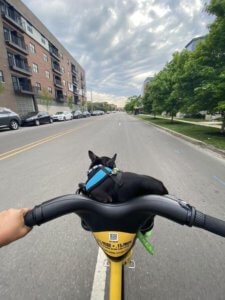A big selling point of Walk/Bike/Places, the annual conference hosted by Project for Public Spaces, is how highly experiential it is for the walking, biking, and placemaking professionals who attend. Instead of only holding sessions inside a venue, part of the Walk/Bike/Places program brings participants — who work in public, nonprofit, and private sectors — outdoors to experience the host city through “mobile workshops” led by local project leaders and business owners.

Presenters for the Walk/Bike/Places online event shared videos they had taken of neighborhoods to point out good and bad public planning examples.
So when the 2020 Walk/Bike/Places event in August was forced to move online due to COVID-19, organizers and speakers had to find new ways to bring city spaces to its more than 500 digital attendees through their screens. “Mobile” workshops took on a different meaning — as in accessed via a device rather than experienced on foot.
“Mobile workshops are really the highlight of our conference,” said Juliet Kahne, Ph.D., director of events for Project for Public Spaces. “They’re very in-depth and interactive, and they’re a great networking opportunity for participants. So we knew this year was going to be a challenge,” she said. Session leaders had to adapt to the new environment and consider how to turn a tour, she said, “into something that people are going to engage with online.”
Speakers rose to the challenge during the event, held live Aug. 3-7, on Zoom. The program retained many of the sessions planned to be presented at the in-person event, with an online twist. For example, Kahne said, one mobile session was intended to be a bike tour of Indianapolis in which attendees would learn about “bad planning” — poor public space decisions that created obstacles for cyclists. For the online session, the session leaders took photos and videos of the sites they were going to point out during the in-person tour and shared them as part of their presentation.
“They were chatting back and forth in a funny nature,” Kahne said, “and showing these videos, making people feel like they were there and seeing the real issues that they would see in person.”
No Borders
Though the in-person event is all about exploring the host city, the online format of Walk/Bike/Places 2020 enabled a broader discussion
of important placemaking issues across North America. At the “Public Space Happy Hour,” Walk/Bike/Places hosted public space managers from different locations to share how their own city’s public spaces adapted during the pandemic, from Tampa to Detroit, while Kahne presented from New York City.
“We all showed up in a public space and talked participants through [what we were seeing] and showed them around on our phones what was actually happening,” Kahne said. Particularly during the summer “when the shutdown was still very evident in many cities, participants could see how quiet the public spaces were in some cases,” she said. “In others, they were still very vibrant. So, it was really helpful for our audience to be able to feel connected to all these places.”
In addition to the happy hour, Project for Public Spaces partnered with AmericaWalks for a two-part digital “walk audit.” Using the AARP Walk Audit Tool Kit, a worksheet designed to help people identify neighborhood routes and rate them based on how pedestrian-friendly they are, participants set out in their own communities to observe safety and maintenance issues, aesthetic appeal, and more.
“The next day, attendees came together and analyzed some of the documentation and photos that people had taken, sharing good things and bad things they saw about getting around their neighborhood,” Kahne said.
The Trail Ahead
In June 2021, Walk/Bike/Places will be a hybrid event. The in-person component will take place in Indianapolis, pre-pandemic host of the 2020 event. Kahne expects 85 percent of attendees to remain online, where she anticipates making use of pre-recorded segments and even possibly using GoPro cameras to immerse digital attendees in the city of Indianapolis. A large portion of the in-person experience will be outdoors, according to Kahne.
“We want to keep the groups small, and they’re going to be going around and learning all about Indianapolis for pretty much their whole time,” she said. “Something we promote a lot is how change in public space can take place by the people who live in them and it doesn’t have to be expensive and it can be very creative in taking ownership over your city or your neighborhood. I think that was something that the pandemic has really highlighted and something we’re going to feature front and center at our 2021 conference. We’re going to be learning from people all about what they did and what they learned what works, and what didn’t. I find that really exciting.”
Casey Gale is associate editor of Convene.
